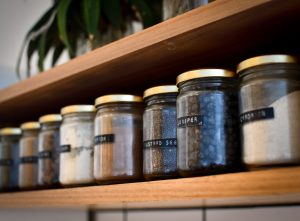Meal planning and Cooking
Tips for a food waste free houseshare
Tips for a food waste free houseshare
More and more people are starting to think about how the foods they eat impact the planet. No matter what you choose to eat, reducing the food that you waste reduces your environmental impact.
The processes of growing, transporting and storing our food all require energy and water, along with packaging, labour, machinery and other resources. All of this activity generates greenhouses gases which drive climate change. In fact, it was estimated that 28% of the global agricultural land is used to grow food that ends up being wasted [1]. Reducing food waste has been identified as one of the most effective actions we can take to combat climate change! [2]
For those of us living with housemates, managing food can be a little extra tricky. If you’re living at home as an adult or newly navigating the world of the house share, we have put together a list of ways you can make sure no food ends up wasted. See what works for you!
1. Set up a sharing shelf in the cupboard or fridge to let everyone know that food left there is fair game. You could also just use a place mat on the table or counter. This is especially useful if members of the household are going away for the weekend. One person’s trash is another person’s treasure so ask your housemates if they would like to eat something that you’re not keen on or you’ve made too much of.
2. Share the basics. If it works in your house, sharing everyday foods like milk and butter, oil and salt will avoid duplicates. This saves space and can stop them going to waste. Only use milk for tea, or butter the odd time on toast? Setting up a kitty will avoid problems here with sharing the costs.
3. Share the weird ones. On the other hand, sharing more obscure or rarely used ingredients is also a great idea and saves money when it comes to trying new dishes. Kaffir lime leaf anyone?

4. Cook together. Lots of housemates started cooking together more this year. Sharing meals can prevent food waste and gives everyone a night off from cooking. While there may be differences between cooking abilities, most people have a signature dish up their sleeve. Learn from one another and come up with household specific pot luck dishes. If you are eating together, let your housemates serve themselves or serve food in dishes at the centre of the table and let people take what they need. This will stop food going uneaten on people’s plates and ending up as waste. We’re much more inclined to save leftovers from a serving dish than from someone’s plate.
5. Label your freezer food. Nobody wants to be the one with a clipboard in the kitchen, but let’s face it, freezer space is a hot commodity. Even the best of us can lose track of what’s gone in there. Keep some labels or even just a marker near the freezer. Before anything goes in, label it with who owns it, what it is and the date. Alternatively, keep a list stuck to the door or lid to remind you what’s in there. This will avoid the dreaded defrosting (and often binning!) of food when it comes to moving out.
6. Use a brown bin. If there is a food bin provided, it’s a great idea to use it. While it can end up being a bit of a stinky job to empty it, it then makes emptying the general waste bin a breeze. The stink has to go somewhere! Food waste that goes in the brown bin gets treated and turned into compost – going back into the soil or alternatively, it is used to make renewable energy.
7. Pay some attention to your food waste. Many of us end up wasting the same foods over and over again. Keep buying large packs of veg that are on offer? Or buy food for the whole week but usually end up getting takeaway on Friday? Most of us feel bad when we throw away food and so, we don’t like to think about it. If you’re putting food in the bin, take a second to ask yourself – ‘Why did this end up as waste?’ and ‘What can I do differently next week?’.
8. Equip yourselves! Having a stash of lunch boxes and reusable containers at home is super handy and makes it easier to properly store leftovers in the fridge. A few clips (or even clothes pegs) are brilliant for keeping dry goods sealed. For a cheap option, clear glass jars with lids are also very useful. (Warning: you might find yourself becoming a jar hoarder!)
Living with others can be challenging. Whether there are now three of you trying to work from home over an unstable internet connection or someone has left on the immersion (again!), communicating always seems to be the biggest issue as well as the main solution to all the strife. Although every household is different and often food is prepared and consumed separately, communicating with one another will almost certainly bring about some resolve to prevent food waste piling up. May the force be with you! Good luck.
- FAO, 2013. Food Wastage Footprint. Impact on Natural Resources
- https://drawdown.org/





